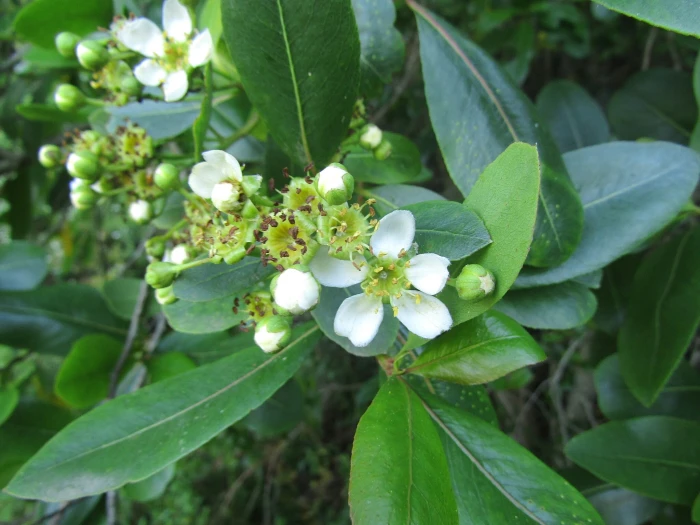Bollen
/
(Kageneckia oblonga)
Bollen (Kageneckia oblonga)
/

Avilez
CC BY 4.0
Image By:
Avilez
Recorded By:
Copyright:
CC BY 4.0
Copyright Notice:
Photo by: Avilez | License Type: CC BY 4.0 | License URL: http://creativecommons.org/licenses/by/4.0/ | Rights Holder: Avilez | Publisher: iNaturalist | Date Created: 2022-10-31T10:35:21-07:00 |

























Summary
Kageneckia oblonga, commonly known as bollen, is an evergreen tree or large shrub native to the Mediterranean climate regions of central Chile, particularly from Coquimbo to Malleco (29° to 38°S). It is adapted to the sclerophyllous forests, which are characterized by dry summers and wet winters, and it is often found on steep, rocky slopes. This species is a key component of the matorral ecosystem, which is a type of shrubland or woodland habitat. Kageneckia oblonga typically grows up to 16 feet tall and features very leathery, toothed oblong leaves that are adapted to conserve water. Its star-shaped white flowers are unisexual and bloom in clusters, adding ornamental value to the plant during the flowering season. The fruit is a pentamerous capsule containing winged seeds, which are dispersed by wind.
Kageneckia oblonga is valued for its hard, durable wood, which is traditionally used for making tools. In addition to its utilitarian uses, the plant has medicinal properties and has been employed as an emetic and laxative in traditional medicine. In cultivation, it is appreciated for its drought tolerance and can be used in xeriscaping, as well as for ornamental purposes in gardens that mimic its native habitat. It requires well-drained soils, can tolerate poor fertility, and thrives in full sun to partial shade. While not commonly found in cultivation outside its native range, it can be a unique addition to a garden, offering year-round foliage and seasonal flowers. Care should be taken as the plant may have potential toxicity if ingested.CC BY-SA 4.0
Kageneckia oblonga is valued for its hard, durable wood, which is traditionally used for making tools. In addition to its utilitarian uses, the plant has medicinal properties and has been employed as an emetic and laxative in traditional medicine. In cultivation, it is appreciated for its drought tolerance and can be used in xeriscaping, as well as for ornamental purposes in gardens that mimic its native habitat. It requires well-drained soils, can tolerate poor fertility, and thrives in full sun to partial shade. While not commonly found in cultivation outside its native range, it can be a unique addition to a garden, offering year-round foliage and seasonal flowers. Care should be taken as the plant may have potential toxicity if ingested.CC BY-SA 4.0
Plant Description
- Plant Type: Tree, Shrub
- Height: 8-16 feet
- Width: 2-4 feet
- Growth Rate: Moderate
- Flower Color: White
- Flowering Season: Spring
- Leaf Retention: Evergreen
Growth Requirements
- Sun: Full Sun, Part Shade
- Drainage: Medium
Common Uses
Bird Garden, Drought Tolerant, Low Maintenance
Natural Habitat
Native to the Mediterranean climate regions of central Chile, particularly sclerophyllous forests and matorral ecosystems
Other Names
Common Names: Chilean Guindo, Palo Santo, Bollén, Huayu Colorado, Guindo Serrano
Scientific Names: Kageneckia oblonga, Kageneckia crataegifolia, Kageneckia crataegoides, Kageneckia ovata, Lydaea lyday
GBIF Accepted Name: Kageneckia oblonga
